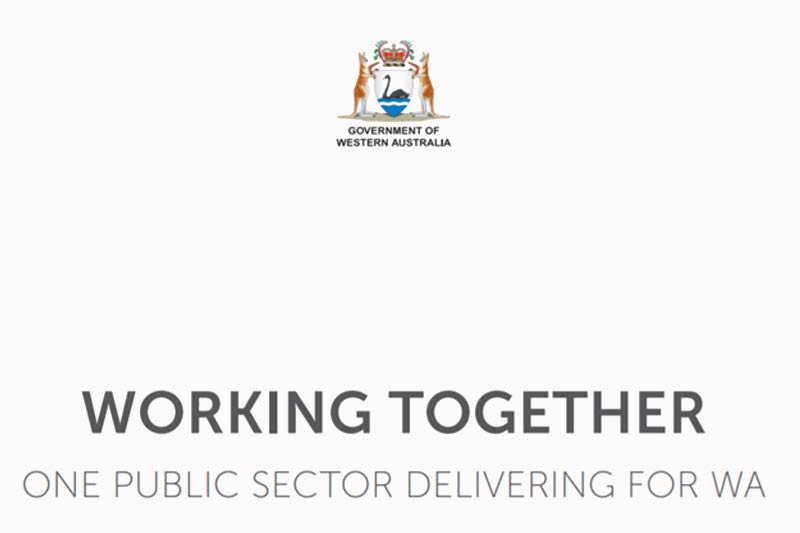
The final
report of the Service Priority Review in Western Australia (WA) was released
on December 6, setting out a blueprint for reform and cultural change in
Western Australia's public sector. The report highlights 17 recommendations and
37 actions in which the public sector can operate more efficiently to deliver
better services to the community, at a lower cost. (An interim report had been released in August.)
The independent review panel undertook extensive
consultation over six months with government and non-government stakeholders
across the State. The McGowan Government has endorsed the final report, broadly
supporting the recommendations and will move to begin implementing them next
year.
One of the focus areas for the review was digital
transformation within the WA Government.
Driving the Government’s
ICT strategy
The Office of Office of the Government Chief Information
Officer (OGCIO) was established in July 2015, with the mandate of 1) developing
a whole-of-government ICT strategy; 2) collaborating with government agencies
and industry; 3) stabilising costs and increasing value for money; and 4)
minimising risk in the delivery of ICT across government
It is placed within the Department of Finance and its head,
the Government Chief Information Officer (GCIO), reports directly to the
Minister for Innovation and ICT. The 2017-18 State Budget provides funding for
the OGCIO until 30 June 2018 and indicates that a decision will be made on the
future of the office as part of the 2018-19 budget process.
Submissions to the review pointed to a lack of
cross-government ICT leadership that has consequences in a number of areas. The
OGCIO’s role and mandate is widely regarded as limited and ICT priorities are
accordingly subservient to competing expenditure decisions at agency level. The
review also found that the administrative and reporting framework in which the
OGCIO operates does not support effective administrative oversight and lacks
strong accountability and governance.
The report recommends that the ICT procurement function
should lie within the Department of Finance (DoF) in order to derive better
value and leverage commercial and contracting expertise within that department.
The Panel notes that ICT procurement and purchasing decisions will need to be
soundly based on an understanding of the available and emerging technology,
overall costs and the ICT needs of the public sector.
The review also found the arrangements for sharing cybersecurity
information to be fragmented and underdeveloped. Currently, arrangements to
manage future significant cyber security events are under consideration by the
Office of State Security and Emergency Coordination within DPC. At agency
level, the OGCIO’s Whole-of-Government Digital Security Policy provides
direction for individual WA agencies to manage their digital security risks. The Panel suggests that DPC should, as a
priority, coordinate the development of a proactive action and response plan to
address the specific cyber security risks to the State.
The report goes on to recommend the transfer the policy
functions associated with digital transformation, cyber security and data
sharing of the OGCIO to the Department of the Premier and Cabinet (DPC). Broad-based
policy functions associated with digital transformation, cyber security and
data sharing could be located within the DPC with a clear mandate to drive ICT
policy across the public sector.
Multi-channel
delivery of government services
The report recommends “Increase online service delivery to
provide multiple channels for delivering transactional services”. The suggested
lead for this is the DPC, who should Undertake a feasibility study for
implementation of a whole-of-government multi-channel transactional service
delivery model.
The report notes that many individual agencies in WA have
begun a process of reshaping transactional services and delivering them online
where possible. A triage-based approach to provide a common platform for
locating and accessing online transactional services provided by individual
agencies, known as ServiceWA, is being developed by the OGCIO. But at the
moment, only about 2.5 per cent of government services in Western Australia are
available online.
Moreover, Telecommunication services, including mobile and
internet coverage, are non-existent or unreliable in many remote Aboriginal
communities. Ensuring universal accessibility of services necessiates the
retention of a mix of online, telephone and physical service centres.
The report says that while it is clear that WA is now behind
other jurisdictions in terms of its take-up of integrated and digital service
provision, this represents an opportunity to learn from experiences in other
jurisdictions and reimagine service provision models in WA to make services
conveniently accessible to the community.
A new approach could include both increased availability of
services online and regional co-location of service delivery agencies.
Regionally-located government offices could themselves provide community access
to online transactional services.
Any move to implement service integration and digital
transformation projects requires robust cost-benefit analysis, a deep
understanding of customer demand and consideration of ongoing program
evaluation and benefits realisation. Initial steps towards multi-channel
service delivery for WA should include a comprehensive analysis of potential
models and an assessment of each in terms of costs, benefits, resource demands
and customer needs and expectations. The analysis should inform future decision
making on governance, staging, time-frame and structure to optimise online and
integrated services for WA citizens.
(Editorial note: The WA GCIO, Mr. Giles Nunis delivered the opening keynote address at the Western Australia OpenGov Leadership Forum in Perth today, which we will writing about soon.)
















